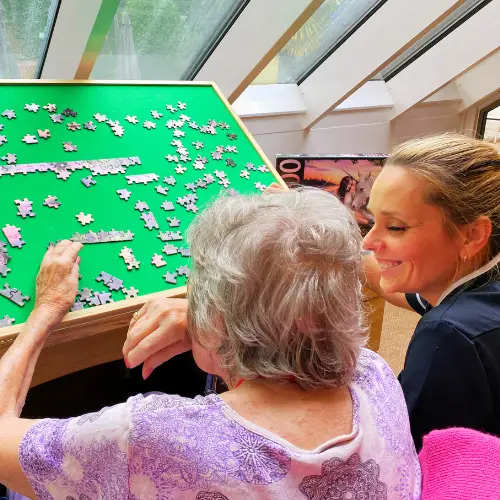Breaking The Taboos About Dementia

The word dementia has many negative connotations, with people leaping to thoughts of memory loss, aggression and confusion. When a loved one is diagnosed with dementia, many can feel lost and ashamed, choosing not to seek help because they are scared of what others will think. This perpetuates the taboo that surrounds dementia.
Dementia is a complex term that covers many conditions that are characterised by a decline in cognitive functions such as memory, logical thinking, language, and problem-solving. Several common types of dementia include Alzheimer’s disease, vascular dementia, and Lewy body dementia. But details of each type go unknown as these sit within the taboo of dementia.
At LuxuryCare, we are dementia care specialists and aim to bust taboos around dementia and raise awareness. Through workshops with residents’ families and a welcoming open-door policy for visitors, we educate as many people as possible, breaking taboo topics.
In this blog, we discuss some of the misconceptions of dementia and share why it is so important that these aspects are embraced rather than hidden.
Common Misconceptions and Taboos
There are many misunderstandings surrounding dementia. These are creating barriers for caregivers from seeking support and assistance from professionals and their loved ones for both themselves and their loved ones.
Misconception: Dementia is Always a Tragic Condition
Reality: While there is no cure for dementia at the moment, it doesn’t mean those diagnosed with the disease must succumb to a life of tragedy. Many will continue to have a quality of life that allows them to continue their hobbies and activities after their diagnosis. And even as the disease progresses, activities can be adapted, and new routines, groups and hobbies can be found to keep those with the disease happy and active. New and old relationships continue to flourish, and when combined with their activities, people live happy and fulfilling lives.
Misconception: People with Dementia Can't Lead Fulfilling Lives
Reality: As said above, those diagnosed with dementia are still able to engage in their favourite activities, maintain relationships and build new ones. As they deteriorate, the activities will need to be adapted, but in doing this, they can continue their passions, allowing them to live a fulfilling lifestyle.
Misconception: Dementia Only Affects Memory
Reality: Memory loss is a common symptom and often the first to be noticed in many types of disease, but it isn’t the only way the condition will affect someone. Dementia impacts the brain, meaning other cognitive functions are lost as the condition worsens. This means reasoning, communication and the ability to complete daily tasks are affected.
Additionally, emotional intelligence is also affected, as they feel more and more confused and frustrated at the lack of their abilities and memories, causing aggression and changing the way they interact with the world.
Misconception: People with Dementia Are Always Aggressive or Confused
Reality: Not everyone with dementia will become aggressive or confused. This is often caused by a fear of what they are experiencing as they have moments of lucidity, remembering who they are, who you are and their life and then they slip into not remembering. This cycle can be confusing, and their lack of understanding can cause them to lash out.
If you can understand the cause of the aggression, you can reduce this behaviour.
Misconception: Dementia is an Inevitable Part of Ageing
Reality: Not everyone will get a dementia diagnosis as they age. Research shows a link between lifestyle and medical care in reducing risk factors.
Keeping active and your brain engaged is a key to maintaining cognitive function.
Misconception: People with Dementia Can't Understand or Communicate
Reality: The ability to communicate will vary as the disease progresses. There are several ways that you will be able to communicate with your loved one, even if they become non-verbal. Music therapy, gardening therapy or reminiscence therapy are great ways to open communication between you and your loved one.
Misconception: There’s No Point in Treating Dementia Because There’s No Cure
Reality: Yes, there is no cure yet. However, there are effective treatments that have been shown to slow the progression down, help those living with the condition remain independent for longer, manage symptoms and improve their quality of life.
Early diagnosis and bespoke care plans are imperative for this.
Misconception: Dementia Patients Are Always Dependent and Need Full-time Care
Reality: The level of care will likely change as the disease progresses. Many people can remain independent for an extended period after a diagnosis. A key to this is letting them stay independent and not removing their responsibilities or abilities before they need to be.
Make sure they stay engaged with activities and relationships for as long as possible.
Misconception: People with Dementia Can’t Learn New Things
Reality: It might take them a little longer and prove to be slightly more challenging, but people who have been diagnosed with dementia can pick up new skills and enjoy new activities and experiences.
Misconception: Dementia is Always Diagnosed Late in Life
Reality: While it is common for dementia to be diagnosed in older adults, it can develop at any age. Early-onset dementia can impact those under 65 years old and will mean specialised care will be needed.
Breaking the Stigma
Dementia is becoming more and more prevalent in our society, and as our society ages, the number of those diagnosed will only increase.
With so many people diagnosed, the right level of care and support needs to be available for those receiving a diagnosis and caring for them.
Through fostering a more understanding society, we can improve the quality of life for those living with dementia. Of course, education will remove perceptions of the disease and help everyone remember their humanity, strengths, and individuality, allowing them to maintain their sense of self and worth.
Finally, an increase in awareness and a decrease in stigma can encourage people to seek an early diagnosis, allowing them to implement strategies to reduce the progression of the disease before it is too late.
At LuxuryCare, we do everything we can to combat the stigma within our care homes in Poole and Bournemouth. Our staff receive dementia specialist training, allowing them to provide unbiased dementia care.
Our residents living with dementia are included in our activities and invited to dine with other residents in our dining room.
We work with our staff and families to combat these taboos and misconceptions and create a safe and loving environment.
Visit one of our homes to see for yourself. Book a viewing by calling 01202 037373 or completing our online contact form.















